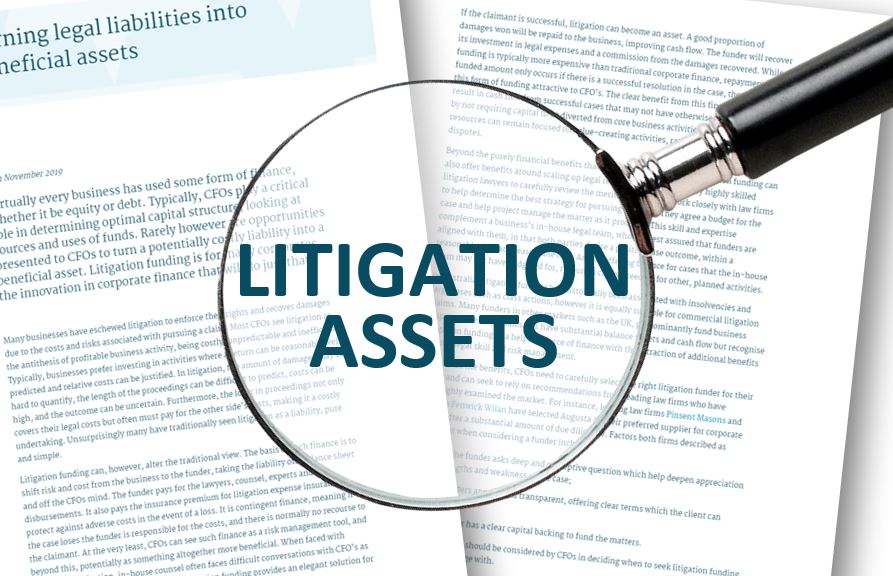
 Back to News
Back to News
Many businesses have eschewed litigation to enforce their rights and recover damages due to the costs and risks associated with pursuing a claim. Most CFOs see litigation as the antithesis of profitable business activity, being costly, unpredictable and inefficient. Typically, businesses prefer investing in activities where a return can be reasonably well predicted and relative costs can be justified. In litigation, the amount of damages may be hard to quantify, the length of the proceedings can be difficult to predict, costs can be high, and the outcome can be uncertain. Furthermore, the loser in proceedings not only covers their legal costs but often must pay for the other side’s costs, making it a costly undertaking. Unsurprisingly many have traditionally seen litigation as a liability.
Litigation funding can, however, alter the traditional view. The basis of such finance is to shift risk and cost from the business to the funder, taking the liability off-balance sheet and off the CFO’s mind. The funder pays for the lawyers, counsel, experts and disbursements. It also pays the insurance premium for litigation expense insurance to protect against adverse costs in the event of a loss. It is contingent finance, meaning if the case loses the funder is responsible for the costs, and there is normally no recourse to the claimant. At the very least, CFOs can see such finance as a risk management tool, and beyond this, potentially as something altogether more beneficial. When faced with unexpected litigation, in-house counsel often faces difficult conversations with CFO’s as to how to deal with the costs and risks. Litigation funding provides an elegant solution for in-house counsel to present to their CFO.
If the claimant is successful, litigation can become an asset. A good proportion of damages won will be repaid to the business, improving cash flow. The funder will recover its investment in legal expenses and a commission from the damages recovered. While funding is typically more expensive than traditional corporate finance, repayment of the funded amount only occurs if there is a successful resolution in the case, thereby making this form of funding attractive to CFO’s. The clear benefit from this finance is that it can result in cash flow from successful cases that may not have otherwise been pursued. And by not requiring capital to be diverted from core business activities, existing financial resources can remain focused on value-creating activities, rather than expensive legal disputes.
Beyond the purely financial benefits that CFOs will typically value, litigation funding can also offer benefits around scaling up legal resources. Funders employ highly skilled litigation lawyers to carefully review the merits of a case and work closely with law firms to help determine the best strategy for pursuing a matter. They agree a budget for the case and help project manage the matter as it proceeds. This skill and expertise complement a business’s in-house legal team, who can rest assured that funders are aligned with them, in that both parties desire a positive case outcome, within a reasonable time at a reasonable cost. And by offering finance for cases that the in-house team may not have budgeted for, resources can be freed up for other, planned activities.
In Australia, litigation funding has historically been associated with insolvencies and large cases such as class actions, however it is equally suitable for commercial litigation claims. Many funders in other markets such as the UK, predominantly fund business disputes where the claimants have substantial balance sheets and cash flow but recognise litigation funding as a helpful source of finance with the attraction of additional benefits around legal skill and risk management.
Despite all the benefits, CFOs need to carefully select the right litigation funder for their needs and can seek to rely on recommendations from leading law firms who have thoroughly examined the market. For instance, leading law firms Pinsent Masons and Holman Fenwick Wilan have selected Augusta as their preferred supplier for corporate clients after a substantial amount of due diligence. Factors both firms described as important when considering a funder include:
All these points should be considered by CFOs in deciding when to seek litigation funding and who to engage with.
…
Interested in finding out more about litigation funding and how you can apply? Contact Neill Brennan, our team of litigation funding experts or Augusta Sydney directly.